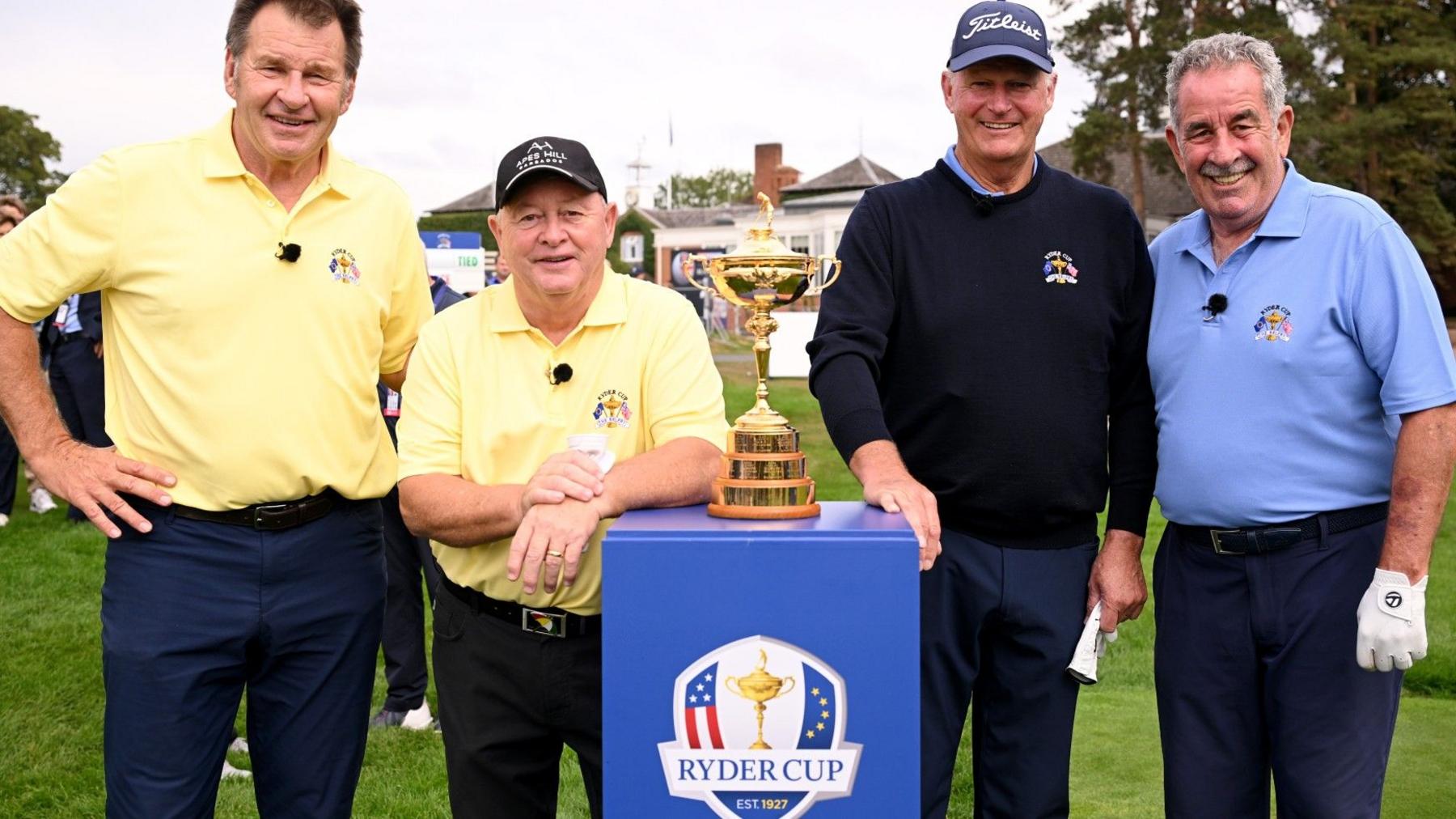'US would never give up being number one but golf needs global tour'

Sir Nick Faldo played alongside Ian Woosnam at the Belfry this week as they beat Sandy Lyle and Sam Torrance in an exhibition match to mark the 40th anniversary of Europe's first win over the United States in the Ryder Cup
- Published
Sir Nick Faldo says it is "really disappointing" that top men's professional golf has not adopted a global schedule and remains dominated by the United States.
Britain's greatest player of the modern era was speaking in the week that new PGA Tour boss Brian Rolapp promised "significant change" for the most lucrative and prestigious circuit.
The recently appointed chief executive unveiled a new competition committee, chaired by Tiger Woods, which has been charged with altering current formats in future years.
"The goal is not incremental change. The goal is significant change," Rolapp promised.
This nine-man panel does not include anyone from Europe, despite the PGA Tour's strategic alliance with the Wentworth-based DP World Tour. "It's an important partnership that we want to figure out how to grow," Rolapp said.
"I think conversations with them and how they might fit in a new competitive model will certainly be part of this committee's work."
But Faldo sees little evidence that the PGA Tour is prepared to embrace a truly global calendar. "That's really disappointing," the six-times major champion told BBC Sport.
"I really did think when we started with the 'global' word a long time ago, probably at least 10 years ago, I thought we were going to lean towards that."
My dream scenario is a world tour - McIlroy
- Published10 January 2024
DeChambeau & Rose qualify for Ryder Cup - who else is in?
- Published27 August
Faldo shares Rory McIlroy's vision for a circuit that would take the best players around the world rather than staying predominantly in the US, which stages three of the game's four majors.
This week the PGA Tour announced that a new Signature Event will be staged at Donald Trump's Doral course in Miami. It means there will now be nine of these big-money elevated tournaments, all staged in the US.
"America would never give up being number one and, yeah, I think it's a shame," Faldo said.
McIlroy called for a world tour to reunite the men's game after the split that followed the arrival of the Saudi Arabian-backed LIV circuit in 2022.
"I thought after the ruckus, the disturbance with LIV coming on board, when they were talking about all that they'd create a real global tour," Faldo added. "We should be doing something like that.
"I'd love them to be actually playing as a top, whatever, 100, 120 players, going around the world, no appearance fees. You're playing for massive prize money, but that is the world tour.
"That's the one to be on, and you travel around, you could organise the schedule.
"Like, we're going this direction in the world for three weeks, guys, and then you're going to have two weeks off, and then we all go another direction for three weeks.
"It could have been done. And if you made that the pinnacle, everybody would strive to be on that tour, and you could make it very volatile.
"It doesn't matter what your name is. If you're playing badly for those three weeks, well, maybe you get booted off and you can go to another tour and you can qualify to come back.
"It needs a bit more competitiveness, rather than the guarantees now of not having to perform for massive amounts."
The 68-year-old Englishman is hosting this week's Betfred British Masters at the Belfry, the last qualifying event for Europe's Ryder Cup team. He says he's involved in talks with new backers to secure the tournament's future.
It is an important event on the DP World Tour, where the leading 10 players for the season secure cards to play in the US the following year. Critics suggest this is a talent drain that renders the European circuit as a "feeder" tour.
Faldo believes leading venues in the UK and on the continent should be used for the biggest tournaments outside the majors, as well as courses in America, Australia, Asia and Africa.
"If the public knew and television knew you had the best 100 players coming to your town or your country, my goodness, how good would that be," he said.
"Rather that than saying, 'well, I'm going to have a tournament and I don't really know what I'm going to get'. It's harsh on the sponsors. It really is.
"The sponsors want to know 'I'm going to get X number of good players and I'm going to have a great event'.
"In America, they're forking out 20, 25 million [dollars] to create a tournament. It's a heck of a lot, isn't it? We've got to find a formula to give to the sponsors.
"Otherwise, they're going to say, what am I getting out of this?"